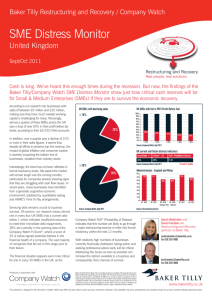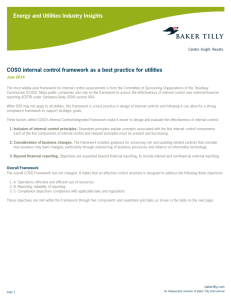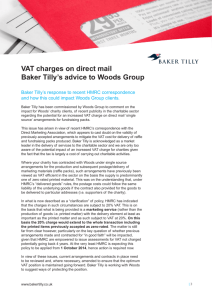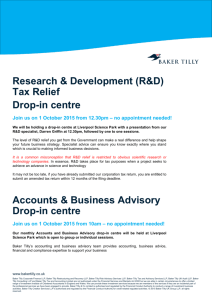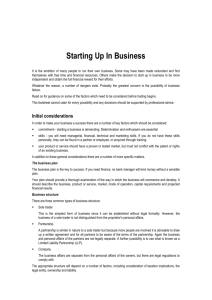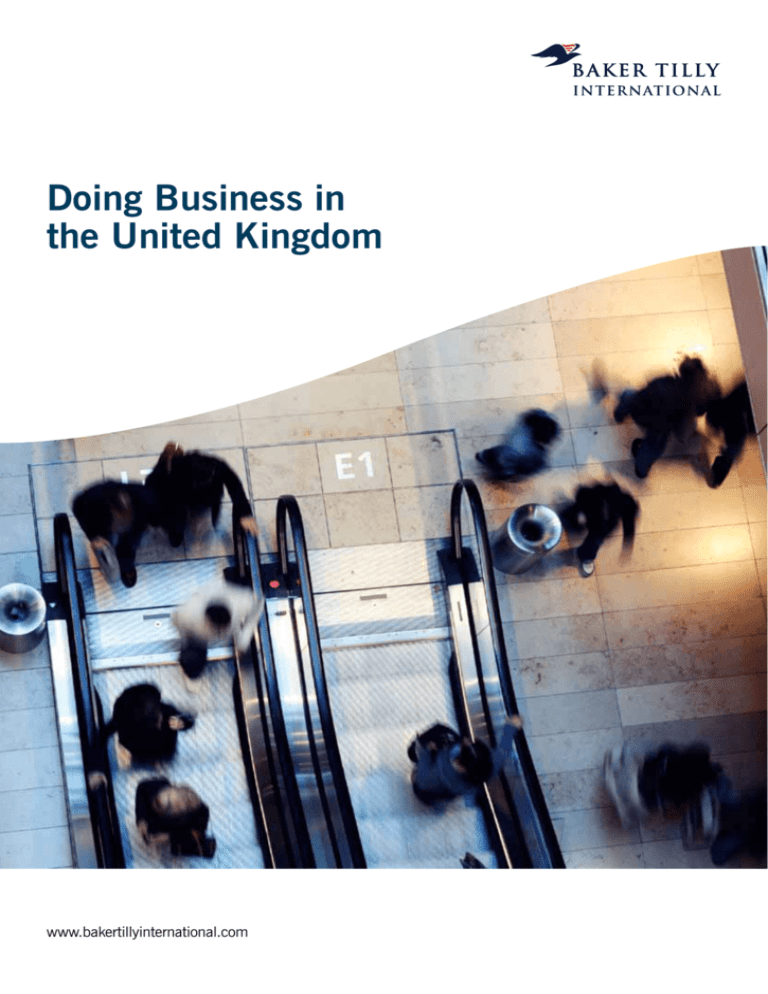
Doing Business in
the United Kingdom
www.bakertillyinternational.com
Preface
This guide has been prepared by Baker Tilly, an independent member of Baker
Tilly International. It is designed to provide information on a number of subjects
important to those considering investing or doing business in the United
Kingdom (UK).
Baker Tilly International is the world’s 8th largest network of independent
accounting and business advisory firms by combined fee income, and is
represented by 149 firms in 125 countries and over 24,000 people worldwide.
Its members provide high quality accounting, assurance, tax and specialist
business advice to privately held businesses and public interest entities.
This guide is one of a series of country profiles compiled for use by Baker
Tilly International member firms’ clients and professional staff. Copies may be
downloaded from www.bakertillyinternational.com.
Doing Business in the UK has been designed for the information of readers.
Whilst every effort has been made to ensure accuracy, information contained
in this guide may not be comprehensive and recipients should not act upon it
without seeking professional advice. Facts and figures as presented are correct at
the time of writing.
Up-to-date advice and general assistance on UK matters can be obtained from
Baker Tilly; contact details can be found at the end of this guide.
June 2012
Doing Business in
the United Kingdom
1
Contents
1 Fact Sheet 2
2 Business Entities and Accounting 2.1 Companies 2.2 Partnerships 2.3 Sole Proprietorships 2.4 Branches and Places of Business 2.5 Audit and Accounting Requirements 2.6 Filing Requirements 4
4
5
5
5
5
5
3 Finance and Investment 3.1 Exchange Control 3.2 Banking and Sources of Finance 3.3 Tariffs 3.4 Foreign Investment Incentives/Restrictions 6
6
6
7
7
4 Employment Regulation and Social Security 4.1 Entry Visa and Work Permit Requirements 4.2 Hiring Local Employees 4.3 Trade Unions 4.4 Social Security System 8
8
8
9
9
5 Taxation 5.1 Corporate Taxation 5.2 Individual Taxation 5.3 Other Taxes Which May Affect Foreign Investors 10
10
11
11
2
1 Fact sheet
Geography
Location North-western Europe, surrounded by the Atlantic Ocean, the North Sea, the
English Channel and the Irish Sea
Area
94,248m² (244,101km²) consisting of England, Wales, Scotland and Northern
Ireland
Land boundaries
Northern Ireland shares a boundary with the Republic of Ireland
Coastline 7,723 miles or 12,429km
Climate
Temperate – an average of 4°C-6°C in winter and 17°C-22°C in summer; annual
average rainfall is 1,100mm
Terrain Mainly agricultural lowland with mountainous areas in northern England, Wales
and Scotland
Time zone GMT (+1 hour for British Summer Time (BST))
People
Population 62.218 million
Religion
Christianity, Judaism, Islam, Hinduism, Sikhism and Buddhism
Language English
Government
Country name
United Kingdom of Great Britain and Northern Ireland
Government type
Parliamentary
Capital London
Administrative divisions
The UK is divided into 650 constituencies – 533 in England, 18 in Northern
Ireland, 59 in Scotland and 40 in Wales
Political situation The Queen is head of state and the country is governed by parliament
based at Westminster in London. Parliament comprises of two houses – the
House of Commons and the House of Lords. Government is formed from
the House of Commons by the political party winning the most seats in a
general election (currently coalition of Conservatives and Liberal Democrats).
Elections must be held every five years
Doing Business in
the United Kingdom
3
Economy
GDP – per capita US$39,604 (2011)
GDP – real growth rate
0.6% (2011)
0.8% projected for 2012
Labour force
31.45 million (2010)
Unemployment 8.2% (2012)
Currency (code)
Pound sterling (GBP or £)
4
2 Business Entities and Accounting
2.1 Companies
Commercial entities usually take the form of limited liability companies with
share capital. Companies may be limited by guarantee of their members rather
than by shares, but generally it is only charities or not-for-profit organisations
which operate in this way.
A company may be incorporated either as a public or a private company. Only
a public company (PLC) may offer shares or debentures to the general public. A
PLC must have an allotted share capital of at least £50,000, of which at least
£12,500 together with any premium must be paid-up, and there must be at
least two shareholders.
There is no minimum share capital requirement for a private company (LTD).
It may have only one shareholder. There are no restrictions on the maximum
number of shareholders for either type of company.
A private company need have only one director, but a public company must
have at least two. At least one of these directors must be a person. There is no
requirement that directors must be UK or EU nationals. A PLC is required to
have a suitably qualified company secretary in addition to its directors. This is
optional for a private company. It is also necessary to have a registered office
– this has to be in England, Wales, or Scotland depending on the country of
incorporation.
Where a foreign-based enterprise chooses to operate in the UK through a UK
incorporated subsidiary company, it will usually do so by means of a private
company.
2.2 Partnerships
Partnerships can be either general partnerships, where the partners each have
unlimited liability for the debts and obligations of the firm as a whole, or limited
partnerships, where one or more of the general partners have unlimited liability and
the limited partners have liability only up to the amount of their capital contributions.
A partnership is defined in law as the “relationship which exists between persons
carrying on a business in common with a view to profit”. Except in Scotland, a
partnership is not regarded as a separate legal entity distinct from its members.
The limited liability partnership (LLP) is an alternative business structure which has
the benefits of limited liability but allows the internal and tax matters to be dealt with
as a traditional partnership. The LLP must have two or more members and must
conduct business with a view to profit. By providing its members collectively with a
form of limited liability, the LLP offers the prospect of asset protection to proprietors
of unincorporated businesses for whom no such protection was previously available.
The LLP is taxed in much the same way as a general (unlimited) partnership.
Doing Business in
the United Kingdom
5
2.3 Sole Proprietorships
Whilst this mode of trading can be very attractive to UK nationals, due to the fact
that there is no specific regulation applying, other than the requirements of the
tax authorities Her Majesty’s Revenue and Customs (HMRC) to submit annual tax
returns, it is not inherently suitable for inward investment due to the lack of structure
and the fact that the sole proprietor becomes UK resident for taxation purposes.
2.4 Branches and Places
of Business
An overseas company can set up a place of business in the UK without forming a
UK subsidiary company, and in this case it is said to have a branch in the UK.
A branch is not a separate legal entity, but an extension of the foreign company. The
foreign company is, therefore, responsible for the liabilities of its UK branch.
2.5 Audit and Accounting
Requirements
All businesses must maintain proper books of account for taxation purposes and
retain the accounting records and associated documents for not less than six years.
All public companies must have their financial statements audited by a registered
auditor. LLPs and private companies with an annual turnover exceeding £6.5m must
also be audited; below that level, LLPs and private companies may be exempt from
audit if they meet various other criteria. Most financial statements are presented in
sterling although, perhaps surprisingly, any currency may be used.
2.6 Filing Requirements
All limited companies and LLPs must file financial statements at a central registry
(Companies House); small companies and LLPs may file in an abbreviated form
of financial statements if they meet the necessary criteria. An annual return giving
details of directors and shareholders must also be filed. Groups (except small groups)
must file accounts in consolidated form. Intermediate holding companies may be
exempt from preparing group financial statements themselves subject to meeting
various criteria which include being consolidated at a higher level. In such cases, the
consolidated financial statements of the parent need to be filed.
Branches of foreign companies must file details of the branch and its head
office at Companies House within one month of setting up the branch. Financial
statements of the foreign parent must also be filed annually, although, depending
on their nature, there is no requirement for them to be audited.
6
3 Finance and Investment
3.1 Exchange Control
There are no exchange controls in the UK on inward or outward investment;
foreign currencies can be bought and sold freely. There are no restrictions on the
maintenance of foreign currency bank accounts in the UK.
Laws are in place to prevent the laundering of the proceeds of serious crime.
3.2 Banking and Sources
of Finance
There are a number of ways in which businesses can obtain finance in the UK. It is
possible for businesses to raise equity finance. The main sources of this type of finance are:
• The London Stock Exchange – one of the world’s leading exchanges for
raising finance. There are different markets to suit individual needs. The
Main Market is for established companies which can seek either a premium
or less regulated “standard” listing; the AIM Market is designed for smaller
businesses wishing to grow and is widely recognised as the world’s most
successful market for growth companies
• Private equity firms which make investments from as little as £2m up to
many hundreds of millions in businesses with growth potential. Outside the
US, the UK has the most developed private equity market in the world
• Tax incentivised sources- these are Venture Capital Trusts (VCTs) and the
Enterprise Investment Scheme (EIS) whose source of funds derive from high
worth individuals who obtain generous tax breaks for investing directly (under
the EIS) or indirectly (via VCTs) in qualifying unquoted (but can include AIM)
companies. Recent changes to the legislation can allow certain non UK
businesses to raise finance under these schemes
• Business angels – high net worth individuals who operate either alone or in
groups investing typically between £20,000 and £2m.
Within the UK, businesses have access to commercial loans, mortgages and
credit facilities. The UK banking system is large, sophisticated and has many of
the world’s major banks operating within it.
There are various ways other than the traditional methods in which businesses
in the UK can obtain finance, such as:
• Seed funds – usually from within universities, supporting innovative technology projects
• Community Development Venture Funds (CDVFs) – for those businesses that
are based in deprived areas of the UK
• Grants – a range of grants are available within the UK usually offered by
government organisations.
Doing Business in
the United Kingdom
7
3.3 Tariffs
HMRC Integrated Tariff of the United Kingdom is based on the European
Community Common Customs Tariff (CCT). All member states charge a common
tariff on goods from outside the EU; once this tariff has been paid the goods are
free to move around member states at no additional charge. However, the goods
may still be subject to other local charges specific to each member state, such
as excise tax and value added tax (VAT).
3.4 Foreign Investment
Incentives/Restrictions
Businesses are able to gain access to grants and incentives provided by the
following government organisations:
• The EU
• National UK government departments
• Regional government departments
• Local authorities.
Most incentives are available provided certain criteria are met.
The UK Government is a supporter of businesses, both domestic and foreignowned, involved with research and development (R&D). Support includes:
• R&D tax credits and allowances
• Grants for R&D
• EUREKA, a European initiative for promoting joint industry-led R&D in fields
of advanced technology. Benefits include access to new technologies and cost
and risk-sharing
• European Commission framework programme, with an R&D budget of €35bn
to €70bn for the period ranging 2007-2013.
Some of the incentives for businesses are regional-based, with each region
throughout the UK offering some form of grant and incentive to businesses with
development initiatives such as innovation, training, capital investment and
expansion.
One of the main UK Government grant programmes for businesses is the
Selective Finance for Investment (SFI), also known as the Regional Selective
Assistance (RSA).
This is designed to support UK-based businesses opening a new facility, or
expanding or modernising an existing facility.
The UK Government currently has no protectionist measures in place, nor does
the UK discriminate against nationals and foreign individuals in setting up a
private company.
8
4 Employment Regulation and Social
Security
4.1 Entry Visa and Work
Permit Requirements
The Home Office UK Border Agency has overall responsibility for considering
applications to enter or stay in the UK. The UK Government normally uses a
points-based system to assess applications although Family migration is not
covered by the points based system.
Skilled workers, investors and entrepreneurs can apply under the points-based
system.
Nationals of the European Economic Area (EEA) or Switzerland are free to enter
and stay in the UK. Nationals of a state that recently joined the EU may have to
register or apply for permission before starting work.
4.2 Hiring Local Employees
The UK engages a flexible labour market with labour regulations designed to
protect both the employee and to ensure companies can operate effectively.
There are a number of key aspects covered by labour regulations to which
employers must adhere. The principal areas included in these regulations are:
• Contract of employment
• Termination of employment contracts
• Redundancy payments
• Working hours
• Minimum wage
• Employment of foreign workers
• Flexible working schemes
• Discrimination
• Retirement age
• Holiday entitlement.
Doing Business in
the United Kingdom
9
4.3 Trade Unions
UK law gives employees the right to join a trade union wherever they work.
This right applies whether a union has been recognised or not. In many
workplaces there is a formal agreement between the union and the employer
which states that the union has the right to negotiate with the employer. In
these organisations unions are said to be “recognised” for “collective bargaining”
purposes. Pay, working hours, holidays and changes to working practices are the
issues that are typically negotiated.
4.4 Social Security System
The UK social security system (National Insurance) pays for a number of benefits
and the retirement pension. Employees and employers must pay National
Insurance Contributions (NIC). NIC are also applied to the costs of the National
Health Service.
Employers are obliged to deduct income tax and NIC from the salary or wages of
their employees according to a tax code issued by HMRC. The code is calculated
based on the circumstances of the employee and reflects, inter alia, the tax
allowances to which the employee is entitled. The tax and national insurance
schemes are administered by HMRCHMRC.
10
5 Taxation
5.1 Corporate Taxation
Companies incorporated under UK law and other companies which are managed
and controlled from the UK are liable to corporation tax on their worldwide
profits including capital gains.
Companies which are not incorporated under UK law nor managed and
controlled from the UK are liable to corporation tax on any trading profits that
they derive from a UK permanent establishment, as defined. Where there is a
double tax treaty between the UK and the country in which such a company
is based its terms may modify the extent to which the company is liable to
corporation tax.
A company’s taxable profits are calculated by reference to its financial
statements, but with adjustments. In particular, the depreciation of fixed assets
charged in the profit and loss account are not deductible in computing taxable
profits.
Relief may be given instead under a separate code of capital allowances.
Historically, relief has been given for the cost of some types of buildings but this
has now been phased out. Relief is given for the cost of plant and machinery,
including plant which is integral to a building, for example lifts and escalators,
central heating and air conditioning installations, and electrical and water
systems.
There are generous tax incentives for expenditure on R&D and a new reduced
rate of corporation tax for qualifying patent related profits from April 2013.
There are different rates of corporation tax depending on the level of profit. A
reduced rate applies if profits for a year do not exceed a “lower limit”. The full
rate applies if profits exceed a “higher limit”. If profits fall between the lower and
higher limits the rate of tax is calculated by a sliding scale formula which gives
a composite rate which is between the reduced rate and the full rate. The lower
and higher limits are reduced for a company if it has “associates”, these being
other companies under common control.
For companies with profits in excess of prescribed levels, corporation tax is
payable in quarterly instalments, commencing in the seventh month of its
accounting period. For other companies, corporation tax is payable nine months
after the end of the accounting period. A corporation tax return must be filed
within one year of the end of the accounting period.
Doing Business in
the United Kingdom
11
5.2 Individual Taxation
Individuals who are resident in the UK, as defined, are generally liable to tax on
their worldwide income and capital gains.
Income tax is charged at graduated rates up to 50% (45% from 6 April 2013)
and capital gains tax at either 18% or 28% (where other income and gains
exceed the basic rate band). A tax free personal allowance is available against
income but is phased out for those with more than £100,000 of taxable income.
An annual capital gains exemption is also available. For the latest tax figures
for the UK, download the Tax Fact information card or app from http://www.
bakertilly.co.uk/publications/Pages/tax-facts-2012-2013.aspx
Individuals who are resident but not domiciled in the UK, meaning broadly that
their natural home country is other than the UK, can elect on a year-by-year
basis to be taxed on the remittance basis. This means that they will not be taxed
on their foreign income and capital gains unless they bring them into the UK
or otherwise enjoy them in the UK. If they elect for the remittance basis they
lose their personal allowances and capital gains annual exemption. In addition,
individuals who have been resident in the UK for seven or more of the preceding
nine years and who elect for the remittance basis must pay a substantial fixed
rate charge which increases further after 12 years.
Individuals who are resident in the UK are generally required to pay social
security contributions at prescribed rates. Different rules apply for the employed
and the self-employed. Those visiting the UK for short periods may be permitted
to remain in their home country social security scheme and to be exempt from
UK contributions.
Inheritance tax is charged on assets passing on death and on some lifetime
gifts where cumulative values exceed prescribed levels. Individuals who are not
domiciled in the UK are not taxed on assets located outside the UK. UK sited
assets are chargeable to UK inheritance tax for all individuals, including those
not resident in the UK.
There is no wealth tax.
5.3 Other Taxes Which May
Affect Foreign Investors
Businesses must pay employers social security contributions in relation to their
employees.
In common with other states of the EU, the UK imposes VAT on the consumption
of goods and services. In general, most businesses do not themselves suffer VAT
as it is a tax payable by the ultimate consumer, but businesses are responsible
for the administration and collection of the tax.
12
They must register with HMRC, add VAT to the price they charge for their goods
and services, and periodically pay over to HMRC the VAT they have charged.
In doing so, they may deduct the VAT they have themselves incurred on their
purchases of goods and services. However, financial institutions, healthcare
providers, property investors and certain other businesses may not be able to
deduct all the VAT they incur.
Stamp duty is payable by UK or foreign purchasers on certain transfers on sale,
including the transfer of shares in UK companies. Stamp duty land tax (SDLT) is
payable by UK or foreign purchasers of UK real estate and on the grant of certain
leasehold interests in non-residential property.
There are no local taxes on business profits. However, the occupiers of
commercial property pay an annual charge known as business rates to the
local government authority. Business rates are calculated as a percentage of a
property’s open market value, and the revenue is used to fund local services.
Doing Business in
the United Kingdom
13
Member Firm Contact Details
Contacts:
Nigel Tristem, nigel.tristem@bakertilly.co.uk
Baker Tilly
25 Farringdon Street
London EC4A 4AB
United Kingdom
T: +44 (0)20 3201 8000
F: +44 (0)20 3201 8001
info@bakertilly.co.uk
www.bakertilly.co.uk
World Headquarters
25 Farringdon Street
London EC4A 4AB
United Kingdom
T: +44 (0)20 3201 8800
F: +44 (0)20 3201 8801
info@bakertillyinternational.com
www.bakertillyinternational.com
Baker Tilly is the trademark of the UK firm, Baker Tilly UK Group LLP, used under licence.
Like us on Facebook
© 2012 Baker Tilly International Limited, all rights reserved
Join our group

